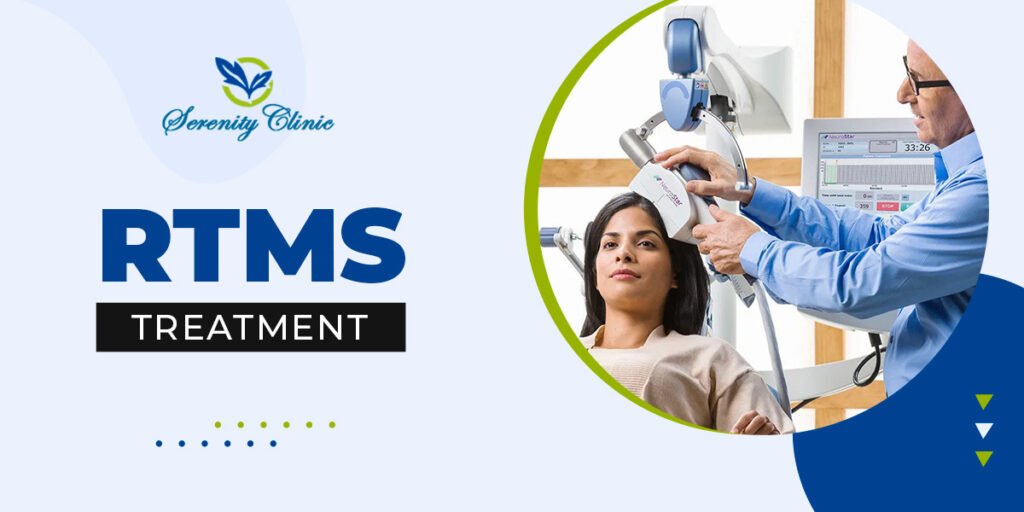TMS (transcranial magnetic stimulation) is an effective therapeutic method for people with treatment-resistant depression. Patients with depression who have not received relief from conventional therapies, such as counselling and medications, could benefit from this non-invasive approach. TMS technology was invented in 1985 and has subsequently received clinical attention. Here are some of the major benefits of rTMS treatment.
Non-Invasive Treatment
TMS is non-invasive, which means it works outside of the body. It does not need surgery or electrode setup. During a diagnosis or treatment session, the TMS machine transmits a modest electromagnetic pulse or wave through the skull into the brain to stimulate certain locations, specifically those cells involved in mood regulation that produce neurotransmitters such as serotonin and dopamine.
The waves utilized are identical to those used in a magnetic resonance imaging (MRI) scan, and they are painless. The TMS operator will ask the patient to remove any jewellery or things that might be impacted by the magnetic waves, such as credit cards, before the session.
A small electromagnetic coil is put against the scalp; the exact placement is dictated by an individual’s head size, the parts of the brain to be targeted, and the type of equipment utilized. The device generates small magnetic waves that trigger the nerve cells through this coil.
Reduced Side Effects
Selective serotonin reuptake inhibitors (SSRIs) and serotonin and noradrenaline reuptake inhibitors (SNRIs) are two types of antidepressants. Tricyclic antidepressants (TCAs) and monoamine oxidase inhibitors (MAOIs) are two additional examples.
Antidepressants do not work for everyone, and for some people, medicine is the best option. However, the medicine’s side effects might be unpleasant for some people. Nausea, reduced libido, headaches, sleeplessness, dry mouth, and dizziness are common antidepressant side effects.
If you are dissatisfied with the side effects of medicine, rTMS treatment could be a better alternative because it has fewer adverse effects. Some people feel nothing, while others get tingling or minor headaches. These effects are usually temporary and go away shortly after your TMS session.
Not Addictive
Some pharmaceutical-based treatments for depression and mental problems are addictive. TMS is completely non-addictive and is beneficial in treating drug addiction as well as other co-occurring illnesses such as PTSD and bipolar, It is utilized at various private rehab facilities to heal addicts and alcoholics alike.
Effective & Long-Term Results
TMS is up to 70% successful in the treatment of mental health conditions, and the advantages last long after the therapy is finished, with 90% of patients still feeling the benefits 12 months later. It has also shown promising results in individuals who previously did not react well to antidepressant drugs.
Boosts Brain Activity
rTMS treatment has been shown to improve cognitive performance in those suffering from depression, such as attention, memory, and executive function. For example, a person who previously fought with attention may discover that following TMS therapy, they can focus more effectively and finish activities more efficiently.
Improved Sleep
rTMS treatment has been demonstrated to improve sleep patterns in individuals suffering from depression, resulting in enhanced rest and everyday functioning. For example, a person who previously battled with insomnia may find it simpler to fall asleep and sleep better after rTMS therapy.
Increased Motivation
rTMS treatment can improve depression patients’ motivation and energy levels. For example, a person who previously found it difficult to engage in daily responsibilities may realize that following TMS therapy, they have more energy and fresh enthusiasm to participate in activities.
Is TMS Right For You?
TMS is a safe, effective treatment that can provide hope to individuals suffering from depression, but it is not for everyone. To learn more about the benefits of rTMS treatment therapy and to find out if it’s right for you, book an appointment at Serenity Clinic.








